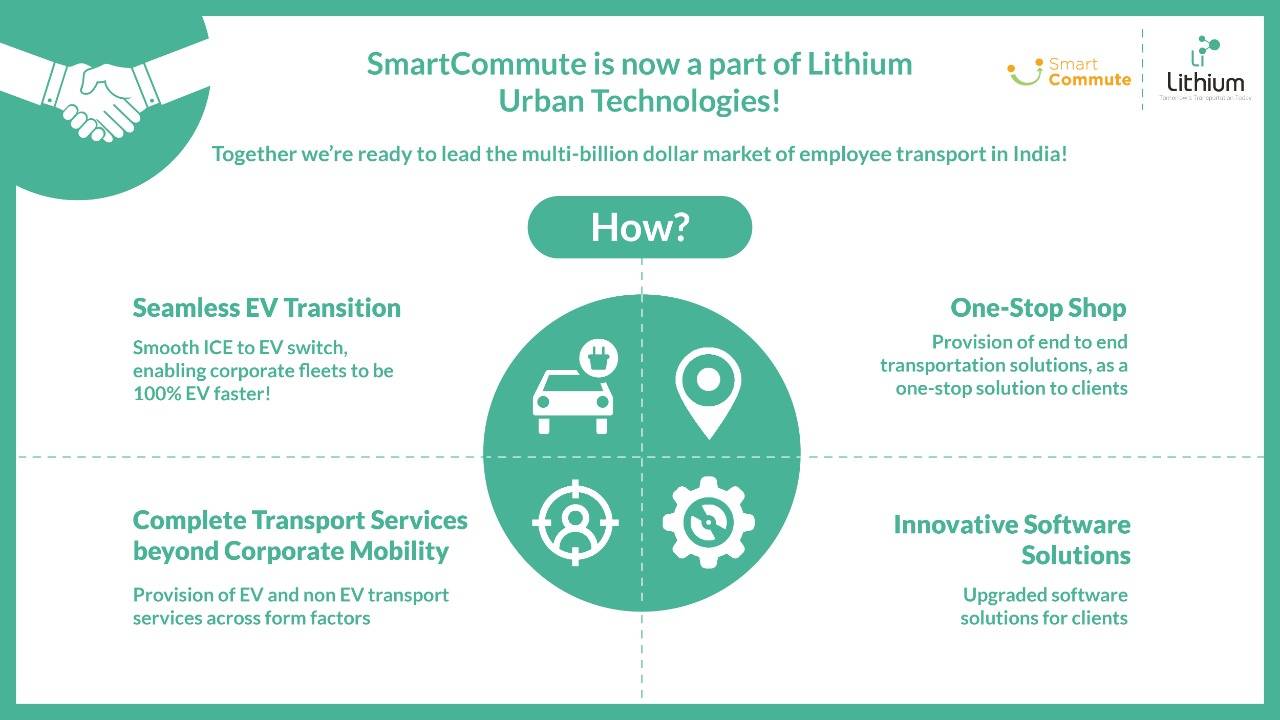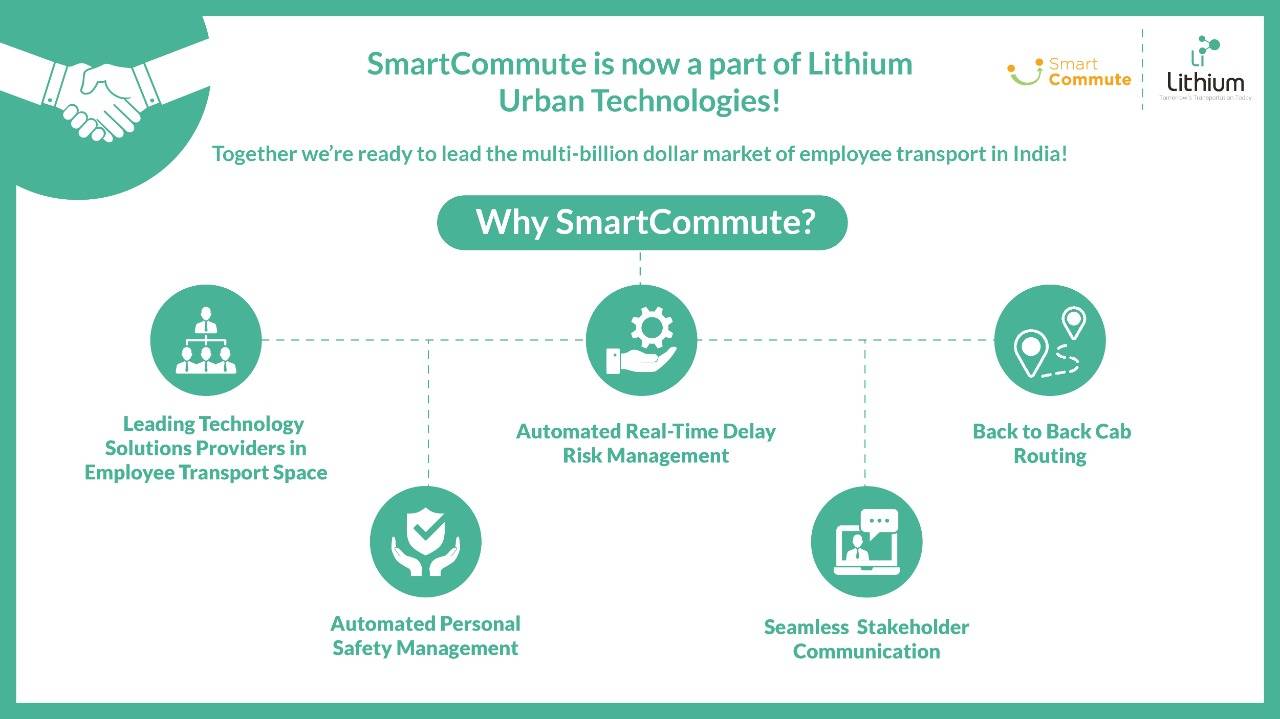
Amit Panday
Pune: Lithium Urban Technologies, the largest fleet operator of electric vehicles (EVs) in India, has acquired 100% stake in SmartCommute, a software-as-a-service (SaaS) platform that provides end-to-end transportation services to corporate employees, a senior company executive told ET Auto in an interview.
The acquisition enables the B2B fleet operator foray into the SaaS domain as a new business vertical to scale up its presence in the multi-billion dollar corporate employee transportation industry. However, Sanjay Krishnan, founder, Lithium Urban declined to divulge details of the deal size.
“Until now, the team at Lithium was into analytics as the technology was used as a means to achieve efficient logistics for our fleet. We never sold software-as-a-service to our clients. We are now foraying into SaaS as a new vertical that will help us better capitalise on the potential of EVs in corporate employee transportation once the market bounces back to normal,” he said.
According to Krishnan, while the demand for shared mobility is down as people continue to work from home amid the Coronavirus pandemic, this is a good time to plan and build the product and consolidate on required technologies in order to be ready when the demand comes back in the future.
Founded in 2014, SmartCommute was developed for simplifying employee transportation services for the corporates.
“SmartCommute was managing about 30,000 – 35,000 employee rides daily before COVID-19. We have more than 3,000 vehicles on the platform and we have handled employee transport for several large IT companies across more than 10 cities in India,” Ajit Patil, co-founder, SmartCommute, said.
With this acquisition, SmartCommute will have Lithium Urban’s EV fleet on its platform enabling it to offer the corporates emission-free rides. Lithium Urban will gain access to the SmartCommute’s customers and to new segments including freight and rapid bus transit, and a large fleet of internal combustion engine (ICE) vehicles. These will consolidate its presence in the B2B transportation services.
Notably, this comes when several companies across sectors, like IT, banking and finance, e-commerce, manufacturing and others, are looking to deploy electric vehicles for transporting employees and moving freight to cut down their carbon footprints. Moreover, EVs used for commercial applications are being recognised to be more cost effective than diesel vehicles.
“Nothing changes for the companies that are already using SmartCommute. The acquisition will enable EVs on the SmartCommute platform. We will integrate our own systems with SmartCommute so that it is able to offer and manage rides across electric and non-electric vehicles,” Krishnan said.
How SmartCommute works
SmartCommute was developed to monitor vehicles deployed for employee transportation to provide safety and security to the women employees working through the day and night, Patil told this publication.
However, it later grew into a complex technology platform providing several critical functions to its clients.
“Typically one centre of a large IT company will have about 20,000 – 30,000 people. As a corporate, it has to organise the commute for all of them efficiently and conveniently. While the IT companies are not experts in transporting people, this is a huge task at hand,” Patil said, adding that employee commute is the third or fourth largest budget item for these companies.
Operating as a commute organizer, SmartCommute performs automated routing, wherein analytics and algorithms are processed to optimise routes, transit time, deployment of vehicles for back-to-back tasks, number and type of vehicles required for specific shifts, passenger data, and other details.
“The platform optimises the number of seats required, distance travelled among other areas to bring down the cost substantially,” Patil said.
“For the IT companies operating during late hours, if the employee reaches late at work, clients impose a delay charge. It is very expensive and is challenging in quality and service. To fix these issues, SmartCommute provides automated delay-risk management wherein not only the time is estimated but if a vehicle is stuck then alternate arrangements can be made quickly,” Patil said. He also highlighted the critical function of the smartphone app-based platform, which is popular among thousands of corporate employees in India.
The transition
According to the senior executive, the leadership team is currently transitioning to Lithium Urban.
“It includes employees across operations and technology. Apart from India, we have customers in Malaysia (manufacturing) and Japan (logistics). They will also transition to Lithium,” added Patil, who plans to step back from an active role but would continue to assist as an advisor in scaling up the utility of the platform.
Employee transportation to bounce back
Lithium Urban, which has more than 1,200 electric vehicles in its fleet, is having only 30%-40% capacity utilisation owing to the COVID-related disruptions. Several EVs in its fleet are deployed for moving essential items, food, medical supplies, oxygen concentrators as well as to take employees for vaccination.
“The market has been down for almost 14 months now as mostly the corporate employees are working from home. We have about 470-480 EVs operational 24X7 currently,” Krishnan said, adding that current capacity utilisation in overall shared mobility space is about 15%.
Even as several industry veterans argue that demand for personal mobility will continue to gain momentum, as people would refrain from using shared rides and public transportation, Krishnan firmly believes that corporate employee transportation is not going to fade away.
“It is not a discretionary choice, it is business-critical. It is not feasible for everybody to use his or her own mode of transport,” he said.
According to him, the IT industry alone employs about 4.5 million to 5 million people across India, who work day and night. He estimates that about 50%-60% of these employees would start going back to office in a staggered manner and the ratio could climb to 70%-75%, as more and more people are vaccinated.
However, he anticipates that the vehicle form factor might change. “For example, more cars or 16-20-seater travellers could be deployed than buses, as occupancy per ride would reduce to ensure social distancing and other safety protocols. In any way corporate transportation will bounce back faster than the typical B2C ride-sharing,” Krishnan said.














